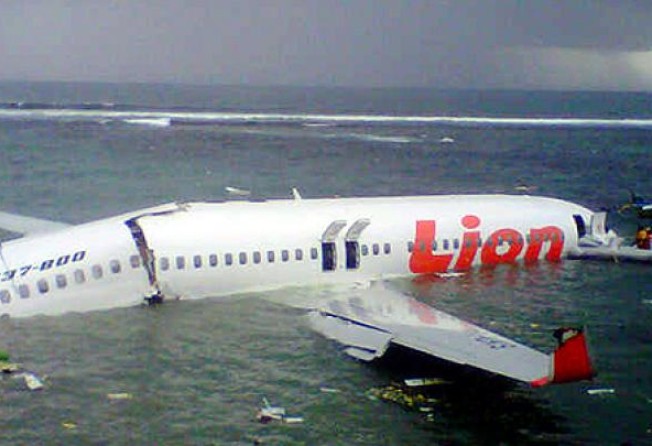Bali crash rings alarm bell on pace of Indonesian aviation sector's growth
Experts warn a lack of experienced flight crews may be a ticking time bomb for safety as Indonesian air travel grows at 20pc a year

The dramatic crash of a Lion Air plane into the sea off Bali has raised fears that Indonesia's fastest-growing carrier may be putting passenger safety at risk with its huge expansion plans, analysts said yesterday.
Experts also warned that Saturday's crash, in which all 108 people on board survived, highlighted a "ticking time bomb" under the country's aviation sector - a lack of experienced crew to meet rapidly growing demand.
Launched 13 years ago with just one plane, Lion Air has made two of the world's largest aircraft orders in a US$46 billion bet on Indonesia's air transport boom.
France announced last month that the carrier had agreed to buy 234 medium-haul A320 jets worth US$23.8 billion from European aerospace giant Airbus. That came after Lion Air astounded the industry with a US$22.4 billion agreement for 230 Boeing 737 airliners signed in 2011 as a visiting US President Barack Obama looked on.
The company is betting big on the formidable expansion of air transport in Indonesia, which is experiencing passenger growth of about 20 per cent every year.
But Saturday's crash has heightened fears that the plans are overambitious for an airline with an already poor reputation after a string of accidents and which is banned from European and US skies over safety fears.
The Boeing 737-800 missed the runway entirely as it came in to land at the airport on the resort island of Bali, hitting the water and splitting in two, causing dozens of injuries but no deaths.
Officials have given no indication as to what may have caused the plane, brand new and delivered to Lion Air last month, to crash. The National Transportation Safety Committee was examining the wreckage, transport ministry spokesman Bambang Ervan said.
The plane's flight data recorder had already been recovered and it was planned to tow the aircraft onto land and retrieve the cockpit voice recorder located in the tail, he said.
Lion Air spokesman Edward Sirait said the Boeing 737-800 Next Generation plane was received by the airline last month and was declared airworthy. The plane had landed in two other cities on Saturday before the crash.
The pilot was experienced, having logged 10,000 flying hours, Sirait said.
Lion Air is currently banned from flying to Europe due to broader safety lapses in the Indonesian airline industry that have long plagued the country.
"I do question whether Lion Air's exponential growth … will put safety at risk," an analyst at Hong Kong-based consultancy Aspire Aviation, Daniel Tsang, said.
"When an airline is too focused on growth and puts an emphasis on cutting costs, safety could be compromised."
An aviation expert at the University of Indonesia, Wawan Mulyawan, who specialises in crew health issues, said the cause of the accident could have been pilot exhaustion. Pilots becoming overworked and rundown could become more of an issue for the country's aviation sector as a whole, he said, as airlines expanded rapidly and there were not enough qualified crew.
"Yesterday's crash was the tip of the iceberg," Mulyawan said. "If the number of pilots cannot grow as fast as the number of planes and flights, we can expect worse cases in the future. It's a ticking time bomb."
Additional reporting by Associated Press